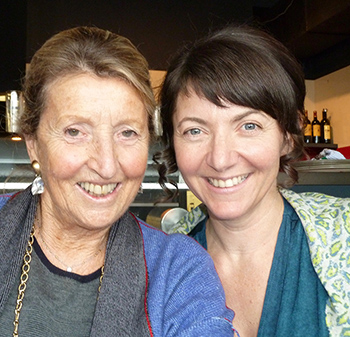
Denise Paluch and Gaby Eirew
Denise Paluch had been to two concentration camps by the time she was four, when she was smuggled out and kept hidden with a false identity for years in occupied France. For a long time, she did not know what became of her parents and for over 50 years, she wondered what had happened to them and hoped against hope that they were still alive.
Years later, the youngest of her four children, Gaby Eirew, has researched and made a free, video-recording question-prompting app to help all parents leave loving messages, information and support for their children for use after death.
Paluch and her husband Ernest Shenton both gave their testimonies to USC Shoah Foundation in 1996.
Eirew said her mother was rounded up in Val d’Hiv in Vennisieux and La Voulte camps and then smuggled out and kept hidden in occupied France, with no family. She was given a false identity to keep her safe during the war. But when the war ended, she was left with little to no true identity. She did not know her full name, her family or any stories related to her life. Eirew’s father left Vienna with his mother and sister in 1939.
Growing up with Holocaust survivors for parents made Eirew and her siblings feel very fortunate to be alive and grateful for each day – but they were also acutely aware that their family was different.
“To this day, I have never met anyone who knew less about themselves than my mum,” Eirew said. “When other children at school had many grandparents and huge family trees, we just had a wilted tomato plant!”
Her parents’ testimonies were the first time Eirew had really heard their full stories, so she is grateful they had the opportunity to be interviewed. Paluch said she wanted to give her testimony to USC Shoah Foundation because “it was the right thing to do” – but would answer the questions differently if she could be interviewed again. She was just beginning to speak about her experiences at the time and was afraid of truly getting in touch with how she felt.
Inspired by her family background and upbringing, Eirew focused her career on working with children and other people affected by trauma, complex stress, grief, bullying and other difficult experiences. After a friend died and left behind three young children the same age as Eirew’s children at the time, Eirew began to research how she could help bereaved children.
The app RecordMeNow can help families of those who have passed.
In her research, she discovered the dozens of questions that people who lost a parent at a young age wish they could ask, from “What do you wish for your child?” to “What advice do you have for dating and going through puberty?” So, she created a free app called RecordMeNow that allows anyone to record himself or herself answering questions that can be given to their family after they’ve passed away, or even before. The questions were drawn from feedback from people who lost one or both parents before the age of 16; they told Eirew what they would have wanted to know or hear from their parents before they died.
Eirew said it is important to know where you come from, and to know the truth about your family’s story, in order to have a full identity.
“With RecordMeNow, we saw that bereaved children wanted permission; to live on, to love again, to hear their parents’ blessings, to know that the death was not their fault,” Eirew said. “They wanted to hear their parents' wishes for them and their naughty stories and to not feel that they had to be perfect, as in truth the dead parent was real and 3D and far from perfect too. We can learn our personal history and that can give us confidence to live on in a more rounded way.”
Paluch agreed. “When I knew that I did not have to keep looking for my parents, that they were dead, there was some real closure and you just bud and grow from that," she said.
RecordMeNow is, in a way, more intimate than the testimonies in the Visual History Archive, but both can help future generations understand and accept the past, and learn how to move on, Paluch added.
“When one person speaks, it is important, but when tens of thousands of people, hundreds of thousands of people speak up, it is a tree or a wall of truth and we need those to stand in evidence and from which to learn and grow; not just about this event but so many times in history,” Paluch said. “And from our individual perspectives, one can't absorb the past without acknowledging it.”